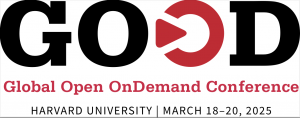The Global Open OnDemand (GOOD) conference will feature more than 50 talks, tutorials, posters and birds-of-a-feather discussions about the use and impact of the Ohio Supercomputer Center’s (OSC) popular web portal, Open OnDemand, on high performance computing (HPC) centers.
The inaugural GOOD conference, to be held March 17-20, 2025, at Harvard University in Cambridge, Massachusetts, has attracted speakers from public and private higher education institutions, companies, research consortia, hospitals and national laboratories, from across the United States and several countries around the world.

“We are delighted by the strong response to our call for proposals for the inaugural GOOD conference, which is designed to help the global Open OnDemand community share expertise about how the technology can benefit research computing,” said Alan Chalker, OSC director of strategic programs. “The breadth of presentations demonstrates the broad adoption of Open OnDemand as a solution for HPC resource access, utilization and advancement.”
In development since 2013 and publicly available since 2017, OSC’s Open OnDemand is now deployed at thousands of sites in dozens of countries across the globe, including at public and private academic institutions, government agencies, non-profit organizations and commercial enterprises. The portal features a simple web browser interface that gives users access to HPC center resources from any device at any time. OSC estimates that Open OnDemand actively supports at least half a million researchers and students who use HPC for discovery and innovation in a variety of disciplines, from computational chemistry to digital arts.
OSC and its partners on the Open OnDemand project developed the GOOD conference to advance the conversation and catalyze collaboration on the web portal, which has been supported by several National Science Foundation grants. The event is designed to support the Open OnDemand community of developers, researchers and HPC professionals.
The GOOD conference will feature:
-
A “Contributor Jam” on the afternoon of Monday, March 17, to give HPC community members the knowledge and tools to contribute code and documentation to the Open OnDemand project. Attendees of all programming levels and experience are invited to participate.
-
Tutorials on Open OnDemand integrations and functionality on Tuesday morning, March 18.
-
Dozens of talks and poster sessions on Open OnDemand deployments, customizations and outcomes at community member institutions from Tuesday, March 18, through Thursday morning, March 20.
-
Birds-of-a-feather and Open OnDemand team-led discussions on a variety of topics from Tuesday, March 18, through Thursday, March 20.
The full program schedule may be viewed on the GOOD conference website.
NumFOCUS, a nonprofit organization that promotes open practices in research, data and scientific computing, is organizing the GOOD conference.
The conference will take place at the Center for Government and International Studies (CGIS) South Building, Harvard University, Cambridge, Massachusetts, and is hosted by the Institute for Quantitative Social Science at Harvard.
Sponsors of the conference are Harvard University, Cambridge Computer, HPC Do IT Now, Intel/Dell (Platinum); Stack Science, Globus, Omnibond (Gold); and MathWorks (Silver).
Registration for professionals and students is now open. The GOOD conference is a welcoming event for all. For information about eligibility for financial assistance to attend the event, please contact the conference organizers at info@openondemand.org.
Full GOOD conference details are available at openondemand.org/good.
The Ohio Supercomputer Center (OSC) addresses the rising computational demands of academic and industrial research communities by providing a robust shared infrastructure and proven expertise in advanced modeling, simulation and analysis. OSC empowers scientists with the services essential to making extraordinary discoveries and innovations, partners with businesses and industry to leverage computational science as a competitive force in the global knowledge economy and leads efforts to equip the workforce with the key technology skills required for 21st century jobs.